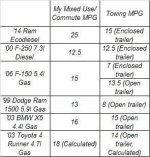Maybe.
As of this writing, Ram 1500 EcoDiesel trucks are just now arriving on dealer lots. The polarization in reactions to the little Turbo Diesels was evident from the moment of its announcement, and opinions have become more entrenched in the months since. One faction, the 5.7-liter Hemi fans, look at the improved mpg, point to the increased fuel costs, and call it a wash. Cummins fans look at the cargo capacity of the 2500 and chortle that the EcoDiesel can carry little more than two well-fed Americans and a beer cooler. However, resounding the thumbs-up have come from the reviewers that got their hands on early builds last year.
There is a niche for this truck, and it may look a lot like your driveway. If perhaps your Cummins does double duty as a daily driver and your tow and payload needs aren’t that high, this might be the Ram for you. If your buddy with the daily driver half-ton also packs on some mileage towing, this might be the Ram for him.
Without a doubt, the EcoDiesel 1500 and is a better ride. Its nimble handling and vastly better mpg will make it a far better daily driver than a Heavy Duty truck. Its vastly better towing mpg than a gasser will make it a fine choice for the half-ton owner that does a fair bit of towing.
My ’00 Ford F-250 PowerStroke truck is half daily driver, half tow vehicle. The truck is a lousy daily driver. A gasoline-powered truck would get terrible mileage towing. The EcoDiesel is going to fix both. I am in the EcoDiesel niche.

The 2000 F-250 PowerStroke diesel and the big enclosed trailer that the gas V8s couldn’t handle. Excellent mileage towing, miserable mileage around town. Austere like a prison cell.
An ascetic is a person who practices severe self-discipline and abstention by living a rigorous life intentionally free of comforts. He would feel right at home in my old truck. Seven hours of expansion joints might even make him crack a smile. Pun intended.
I’m not quite sure when it happened, but at some point as I grew older, vehicles that were loud and spartan in creature comforts became less appealing. Somewhere, I started appreciating a vehicle as a potential quiet sanctuary of luxury and peace. After a day at work or a weekend at a race track, I want quiet on the way home.
Once a month, like clockwork, I pull a 7,000-pound 24’ enclosed trailer 400-800 miles roundtrip to/from a race track in the southeast. Once a year I’ll go twice that far. The same tracks, same routes, and same speeds, month after month. I’ve gone through a number of tow vehicles and two different trailers. I learned that some engines handle the increased load pretty efficiently and some don’t. I also learned that one should be hesitant to look at EPA hwy/city mileage and draw conclusions about towing mpg.
Here are some numbers from vehicles that I’ve owned:
Truck mpg figures from 11 years of towing and daily driving. Note how different the F-250 diesel and the F-150 gas trucks performed. The F-250 was a fuel hog on the commute, but the F-150’s gasoline engine was overwhelmed by the enclosed trailer.
Notes: Ram 1500, 3.0 diesel towing mpg estimate comes from reviews that specifically tested towing. All calculated numbers are from traveling the same routes month-after-month for years. Enclosed car trailer towed at 65mph: 7000 pounds/24’. Open car trailer towed at 70mph: 4300 pounds/16’.
Gas engines have come a long way. Pulling the same open trailer the ’03 BMW X5 4.4-liter got almost twice the mpg (15 versus 8) compared to the ’99 Ram 5.91.

The very efficient 2003 BMW X5 with a 4.4-liter V8.
The trailer’s tire rack was usually left empty for improved mpg.
The Bottom Line
A sweet spot for the EcoDiesel is the owner that wants towing mpg better than your average diesel, and a daily driver mpg better than your average gasser. For the first time you can get the best of both worlds, as long as you can live with class “trailing” cargo and towing capacity.
I’m going to surround myself inside a luxurious new truck. I’m also going to save >$100/mo in diesel costs. That savings will come, ah, right after I buy a tonneau cover, Katzkin seat covers, step rails, mud flaps, air bags…
Stay tuned for further reports in the next issue as I have recently taken delivery of my truck and I’ll have some real-world experiences to share with you.
Scott Gress
TDR Writer
As of this writing, Ram 1500 EcoDiesel trucks are just now arriving on dealer lots. The polarization in reactions to the little Turbo Diesels was evident from the moment of its announcement, and opinions have become more entrenched in the months since. One faction, the 5.7-liter Hemi fans, look at the improved mpg, point to the increased fuel costs, and call it a wash. Cummins fans look at the cargo capacity of the 2500 and chortle that the EcoDiesel can carry little more than two well-fed Americans and a beer cooler. However, resounding the thumbs-up have come from the reviewers that got their hands on early builds last year.
There is a niche for this truck, and it may look a lot like your driveway. If perhaps your Cummins does double duty as a daily driver and your tow and payload needs aren’t that high, this might be the Ram for you. If your buddy with the daily driver half-ton also packs on some mileage towing, this might be the Ram for him.
Without a doubt, the EcoDiesel 1500 and is a better ride. Its nimble handling and vastly better mpg will make it a far better daily driver than a Heavy Duty truck. Its vastly better towing mpg than a gasser will make it a fine choice for the half-ton owner that does a fair bit of towing.
My ’00 Ford F-250 PowerStroke truck is half daily driver, half tow vehicle. The truck is a lousy daily driver. A gasoline-powered truck would get terrible mileage towing. The EcoDiesel is going to fix both. I am in the EcoDiesel niche.

The 2000 F-250 PowerStroke diesel and the big enclosed trailer that the gas V8s couldn’t handle. Excellent mileage towing, miserable mileage around town. Austere like a prison cell.
My Tow Vehicle is Wearing Me Out
As a tow vehicle, the Ford diesel is a big, clumsy, loud and powerful beast. It is a serviceable, if somewhat austere, tow vehicle. As a daily driver it is genuinely awful.An ascetic is a person who practices severe self-discipline and abstention by living a rigorous life intentionally free of comforts. He would feel right at home in my old truck. Seven hours of expansion joints might even make him crack a smile. Pun intended.
I’m not quite sure when it happened, but at some point as I grew older, vehicles that were loud and spartan in creature comforts became less appealing. Somewhere, I started appreciating a vehicle as a potential quiet sanctuary of luxury and peace. After a day at work or a weekend at a race track, I want quiet on the way home.
Towing MPG
When comparing miles per gallon while towing, diesel owners intuitively understand the charm of a diesel engine. In contrast, gas engine owners often don’t get it. They don’t understand that when it comes to towing mpg, diesel is a different animal. Gasoline pickup truck owners look at the EcoDiesel mpg and exclaim “I’m not buying a new truck to gain a couple mpg.” But it’s not about “a couple mpg.” When towing a sizeable load, it’s more like “double mpg.” A couple of miles per gallon probably would not drive a decision.Once a month, like clockwork, I pull a 7,000-pound 24’ enclosed trailer 400-800 miles roundtrip to/from a race track in the southeast. Once a year I’ll go twice that far. The same tracks, same routes, and same speeds, month after month. I’ve gone through a number of tow vehicles and two different trailers. I learned that some engines handle the increased load pretty efficiently and some don’t. I also learned that one should be hesitant to look at EPA hwy/city mileage and draw conclusions about towing mpg.
Here are some numbers from vehicles that I’ve owned:
Truck mpg figures from 11 years of towing and daily driving. Note how different the F-250 diesel and the F-150 gas trucks performed. The F-250 was a fuel hog on the commute, but the F-150’s gasoline engine was overwhelmed by the enclosed trailer.
Notes: Ram 1500, 3.0 diesel towing mpg estimate comes from reviews that specifically tested towing. All calculated numbers are from traveling the same routes month-after-month for years. Enclosed car trailer towed at 65mph: 7000 pounds/24’. Open car trailer towed at 70mph: 4300 pounds/16’.
The fairly efficient 2006 Ford F-150 with its “Modular” 5.4-liter V8. Decent mileage as a daily driver and towing the small open trailer. An unacceptable 7mpg towing the big enclosed trailer.
Gas engines have come a long way. Pulling the same open trailer the ’03 BMW X5 4.4-liter got almost twice the mpg (15 versus 8) compared to the ’99 Ram 5.91.

The very efficient 2003 BMW X5 with a 4.4-liter V8.
The trailer’s tire rack was usually left empty for improved mpg.
The Bottom Line
A sweet spot for the EcoDiesel is the owner that wants towing mpg better than your average diesel, and a daily driver mpg better than your average gasser. For the first time you can get the best of both worlds, as long as you can live with class “trailing” cargo and towing capacity.
I’m going to surround myself inside a luxurious new truck. I’m also going to save >$100/mo in diesel costs. That savings will come, ah, right after I buy a tonneau cover, Katzkin seat covers, step rails, mud flaps, air bags…
Stay tuned for further reports in the next issue as I have recently taken delivery of my truck and I’ll have some real-world experiences to share with you.
Scott Gress
TDR Writer

 Attention: TDR Forum Junkies
Attention: TDR Forum Junkies 








